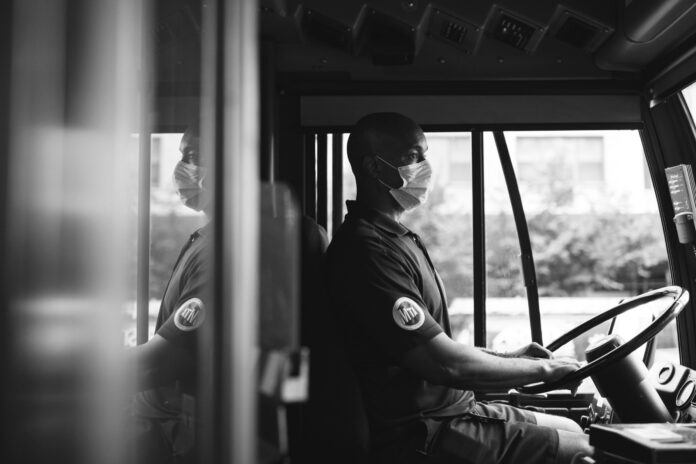This article by Jennifer Gonnerman follows a New York City bus driver, Terrence Layne, as he describes his experiences as a bus driver before and during the pandemic.
Bus drivers are often unappreciated and experience verbal and physical abuse from passengers or others on the streets. Despite the need of bus drivers during the pandemic, this violence towards them has not ceased. Below are excerpts from the article regarding this issue.
- Every veteran bus operator has stories about customers who screamed at them, or cursed them out, or spat on them. As a rookie, Layne was attacked by an irate motorist wielding the steering-wheel lock known as the Club
- A customer can curse out an operator, get off the bus, and suffer no consequences. Layne likens the operator’s predicament to that of the waitstaff in a restaurant. “There are certain positions that our society has identified as those kinds of people that we can abuse and mistreat simply because we are having a bad day or maybe because we are dissatisfied with the service,” he said. “And the bus operator falls into that category.”
- As a bus operator, Layne had been on the receiving end of racial slurs from passengers, motorists, and cyclists. He estimated that such incidents occurred “five or ten times a year easily.”
- “The only thing that’s not susceptible or vulnerable to even a global pandemic: racism.”
Now with the Covid-19 at large, Layne and all the other transit workers are putting their lives at risk in order to provide transportation to the people. However, there are more frustrations that result from a lack of support from M.T.A. and the fear of contracting Covid-19 and spreading it to family.
These Excerpts describe these frustrations:
- By March 8th, the M.T.A. had put out another memo, stating that employees could wear masks “if this makes them more comfortable during this time.” But masks were difficult to obtain, and the M.T.A. didn’t provide them. “They refused to give us masks,” Felix Hidalgo, a bus operator from the Manhattanville depot, said. “Everybody was mad—and bringing stuff from their own homes to clean the buses they were driving.”
- In May, the M.T.A. took an additional step to protect bus operators by installing a vinyl curtain alongside the chain blocking off the front of the bus. Some bus operators weren’t convinced that it would be effective. “It’s just a sheet of clear plastic that doesn’t even extend from the floor to the ceiling,” Layne said. “That certainly is not going to stop an airborne virus from travelling around the cabin.”
- Layne found some bus operators sequestered in their bedrooms, trying not to infect their families; others were living alone. Some “were afraid to seek medical attention simply because they didn’t want to go to a place where they felt there was a greater chance of them becoming sicker.
Gonnerman, Jennifer. “A Transit Worker’s Survival Story.” The New Yorker, www.newyorker.com/magazine/2020/08/31/a-transit-workers-survival-story.
Analysis–
Terrence Layne provides an in depth look at his life as a bus driver in New York City. Along with the article is a voice recording of the interview, which would be an insightful listen.
In this lengthy article, Layne touches on so many topics that has helped me see the problems that transit workers face. The verbal and physical abuse, the health problems that come with the vibrations and constant sitting when driving, and the concerns related to Covid-19. One topic he mentions that has become increasingly prevalent due to the pandemic is racism. Especially as a bus driver, he cannot do anything about it if someone calls him a racial slur. Since no one is out there to protect him and all the other bus drivers. This is an issue that would be interesting to look into. How can we protect bus drivers from both verbal and physical abuse? But in the case of verbal abuse that may have to start with changing society…




